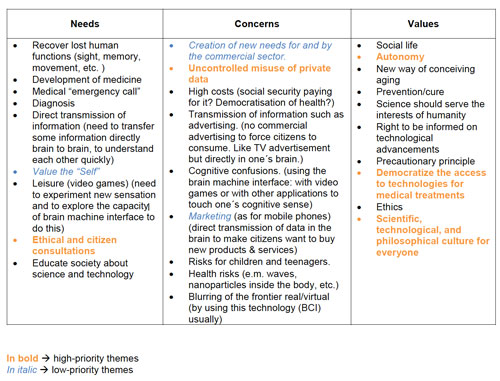| Posted: May 22, 2017 |
Concerns of use of nanotechnologies in the field of brain-machine interfaces
(Nanowerk News) In April, Nano2All, a EU Horizon 2020 project, organized a citizen dialogue on the role of nanotechnologies in the field of brain-machine interfaces.
|
|
The dialogue scenario included a short introduction, the building of a 'future object' by pairs of participants, the production of two narratives associated to each object, and finally a reflection on values, needs, and concerns, that emerged from this work.
|
|
The dialogue had 11 participants (6 women, 5 men): three young adults, 5 adults, and 3 seniors. The role of youngsters in the exercise of building an object was essential. In fact, their imagination and their futuristic visions allowed adults and senior to let themselves free to create and imagine in the first, creative part of the workshop.
|
|
Through the day, the discussions started to converge to end up in a reflection on values, needs and concerns of the participants with respect to nanotechnologies and their roles in brain-machine interfaces.
|
|
Overall, participants mainly wished to underline and communicate values to researchers and decision makers, rather than needs or concerns. Among these values, the organizers underline the notion of social life, equality, and independent choice for everyone: science and researchers are asked to take into account and be in agreement with these values in their work.
|
|
The need of valuing the human dimension in the development of new technologies also appeared very important for the participants. They specifically pointed out that every technological improvement should be made in collaboration with citizens, and within a very strict ethical framework. In fact, the main worries concerning the development of these technologies are related to an unethical and inappropriate use of data, but also to the health consequences of brain implants.
|
|
The conclusions of the workshop focused on the importance of controlling those researches in order to strictly remain within the context of medical needs, and not go beyond them.
|
|
The following table summarizes the main outcomes of the final discussion.
|
 |
| (click on image to enlarge)
|
 By
Michael
Berger
– Michael is author of three books by the Royal Society of Chemistry:
Nano-Society: Pushing the Boundaries of Technology,
Nanotechnology: The Future is Tiny, and
Nanoengineering: The Skills and Tools Making Technology Invisible
Copyright ©
Nanowerk LLC
By
Michael
Berger
– Michael is author of three books by the Royal Society of Chemistry:
Nano-Society: Pushing the Boundaries of Technology,
Nanotechnology: The Future is Tiny, and
Nanoengineering: The Skills and Tools Making Technology Invisible
Copyright ©
Nanowerk LLC

